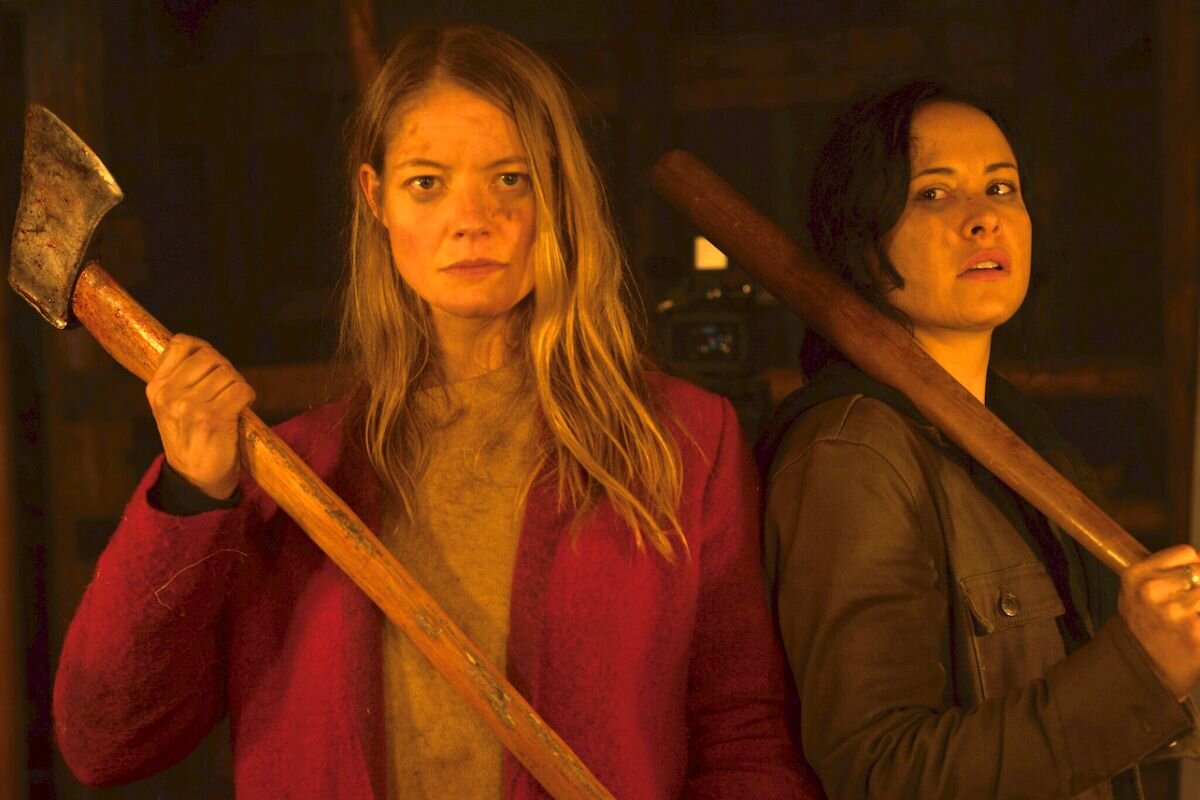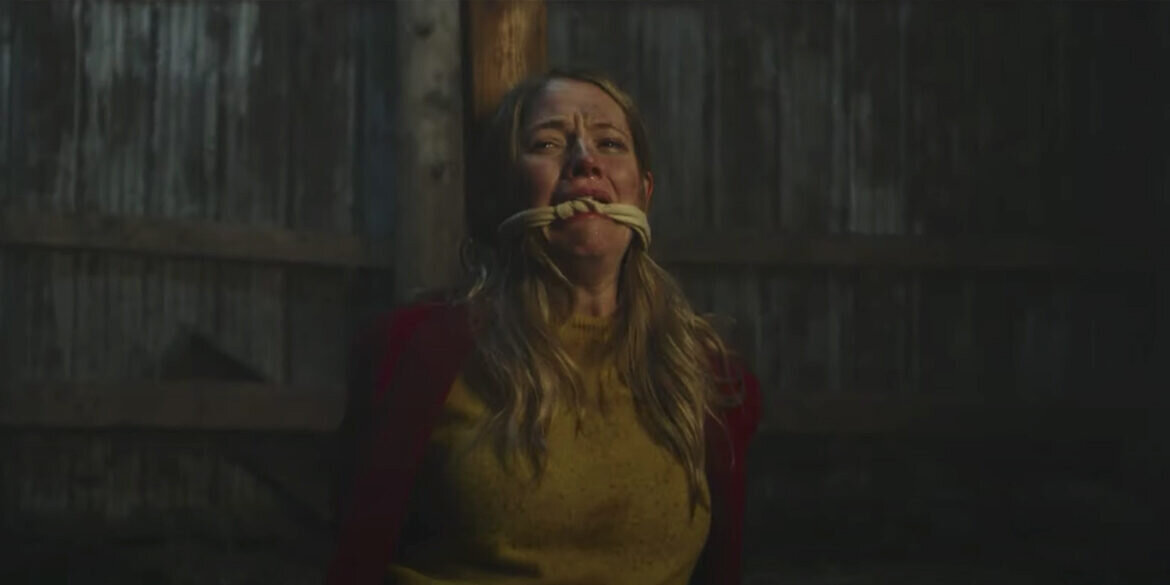[Film Review] The Retreat (2021) Enacts Gruesome Queer Catharsis

Every time there’s a horror movie about city slickers who take an ill-fated trip to the countryside, there has to be fucked-up deer imagery. Once you see the gnarly mangled deer corpse, you can buckle up for the ride. The Retreat leans into this image more so than many other horror films, and in doing so sets up maybe the greatest thematic bait and switch in contemporary horror.
To briefly explain, the film revolves around a queer couple who are attempting to meet their friends, also explicitly queer, at an AirBnB cabin for a weekend getaway and celebration. The locals, in time-honored horror tradition, don’t take kindly to new people showing up in their space, and decide to voice this by committing hate crimes. While it would have been exceedingly easy for the film to slip into yet another showcase of queer pain for cishet folks to clutch their pearls about, Alyson Richard’s screenplay veers the film solidly away from any kind of “bury your gays” trope, even though death happens aplenty. Instead, the film turns the trope of queer suffering for suffering’s sake on its head and has the viewer asking: who are the hunters and who is the hunted?

While the film does not ever veer into voyeurism for queer pain, that doesn’t mean it’s lacking in gore. There are a few very well-shot deaths (a notable one including an old CRT monitor) that really bring home that this movie is about pain, but it’s never going to punch down. While I’m normally wary of getting fully on board with the concept of “earned death” in horror films, you can’t help but feel like each spectacle of death and which deaths happen off-camera make a statement about valuing when death serves something other than making the audience squirm. In the case of this film, each death very clearly serves the goal of delivering queer catharsis: of letting queer women in particular see archetypes of people who have hurt them (reactionary conservatives, complacent straight white women) get their comeuppance.
Director Pat Mill pays homage to slashers past with an absolutely smoldering beginning that isn’t a slow burn but feels like one in the absolute best way: I was viscerally reminded of how most of the original Texas Chainsaw Massacre was just an increasingly uncomfortable teens-on-a-roadtrip story, before Leatherface really becomes a thing in the third act. But despite this feel at the beginning, the film moves at an absolutely breakneck pace, with its eighty -minute runtime leaving you a little breathless at the film’s conclusion. The direction and cinematography also lean heavily into classic scares that linger, rather than having ever-present jumps. There are visual scares – figures appearing in the background are done particularly well – but there are essentially no red herring jump scares, so every moment of tension builds to the final action sequence.

In terms of performances, there are a few standouts. Tommie-Amber Pirie as Renee, one of the queer women being tormented, has an incredible ability to demonstrate the growth of her character from acommitment-phobic burnout to someone willing to stick her neck out for the people she cares about, no mean feat in eighty-ish minutes. The other standout is Celina Sinden, who plays Layna, the wife of the primary antagonist, who not only aids and abets the murder of queer people but who actively takes up her husband’s bigoted cause to maintain the status quo. The scenes between Pirie and Sinden, with Sinden enacting some hard-hitting white female toxicity where she initially attempts to get Pirie’s character to view her as a savior figure, are squirm-worthy in their realism.

Practically, the film is very familiar with the constraints of its own production values and works within them as subtly as possible. There are a few artful cutaways during what the audience assumes is a brutal kill, but which kills are shown and which aren’t also serve the themes in addition to keeping the practical effects budget down. And the kills they do show are very well done; the gore isn’t over the top, but is… pleasing? If gore is your thing.
Overall, The Retreat is a fun queer take on the slasher that serves as both commentary and catharsis. It subverts the expectation of much media that to be queer is to suffer and die by empowering queer folks to be more than victims. In doing so, some of its imagery and characterization can be kind of on the nose – as a queer person who grew up in a rural hunting community similar to the one in the film, I found my nose wrinkling a tad at some of the depictions of hick reactionary conservatives, but I also recognize that queer people’s mileage of life in insular communities will vary wildly. But the fucked-up deer ultimately did not deceive me, and I had a wonderful time with this film.

When people think of horror films, slashers are often the first thing that comes to mind. The sub-genres also spawned a wealth of horror icons: Freddy, Jason, Michael, Chucky - characters so recognisable we’re on first name terms with them. In many ways the slasher distills the genre down to some of its fundamental parts - fear, violence and murder.
Throughout September we were looking at slasher films, and therefore we decided to cover a slasher film that could be considered as an underrated gem in the horror genre. And the perfect film for this was Franck Khalfoun’s 2012 remake of MANIAC.
In the late seventies and early eighties, one man was considered the curator of all things gore in America. During the lovingly named splatter decade, Tom Savini worked on masterpieces of blood and viscera like Dawn of the Dead (1978), a film which gained the attention of hopeful director William Lustig, a man only known for making pornography before his step into horror.
Looking for some different slasher film recommendations? Then look no fruther as Ariel Powers-Schaub has 13 non-typical slasher horror films for you to watch.
Even though they are not to my personal liking, there is no denying that slasher films have been an important basis for the horror genre, and helped to build the foundations for other sub-genres throughout the years.
But some of the most terrifying horrors are those that take place entirely under the skin, where the mind is the location of the fear. Psychological horror has the power to unsettle by calling into question the basis of the self - one's own brain.
On Saturday, 17th June 2023, I sat down with two friends to watch The Human Centipede (First Sequence) (2009) and The Human Centipede 2 (Full Sequence) (2012). I was nervous to be grossed out (I can’t really handle the idea of eating shit) but excited to cross these two films off my list.
Many of the most effective horror films involve blurring the lines between waking life and a nightmare. When women in horror are emotionally and psychologically manipulated – whether by other people or more malicious supernatural forces – viewers are pulled into their inner worlds, often left with a chilling unease and the question of where reality ends and the horror begins.
Body horror is one of the fundamental pillars of the horror genre and crops up in some form or another in a huge variety of works. There's straightforward gore - the inherent horror of seeing the body mutilated, and also more nuanced fears.
In the sweaty summer of 1989, emerging like a monochrome migraine from the encroaching shadow of Japan’s economic crash, Shin’ya Tsukamoto’s Tetsuo: The Iron Man shocked and disgusted the (very few) audiences originally in attendance.
Whether it's the havoc wreaked on the human body during pregnancy, emotional turmoil producing tiny murderous humans or simply a body turning on its owner, body horror films tend to be shocking. But while they're full of grotesque imagery, they're also full of thoughtful premises and commentary, especially when it comes to women, trauma, and power.

RELATED ARTICLES
If you know me at all, you know that I love, as many people do, the work of Nic Cage. Live by the Cage, die by the Cage. So, when the opportunity to review this came up, I jumped at it.
When V/H/S first hit our screens in 2012, nobody could have foreseen that 11 years later we’d be on our sixth instalment (excluding the two spinoffs) of the series.
When someone is in a toxic relationship, it can affect more than just their heart and mind. Their bodies can weaken or change due to the continued stress and unhappiness that comes from the toxicity.
If you can’t count on your best friend to check your teeth and hands and stand vigil with you all night to make sure you don’t wolf out, who can you count on? And so begins our story on anything but an ordinary night in 1993…
The best thing about urban legends is the delicious thrill of the forbidden. Don’t say “Bloody Mary” in the mirror three times in a dark room unless you’re brave enough to summon her. Don’t flash your headlights at a car unless you want to have them drive you to your death.
A Wounded Fawn (Travis Stevens, 2022) celebrates both art history and female rage in this surreal take on the slasher genre.
Perpetrator opens with a girl walking alone in the dark. Her hair is long and loose just begging to be yanked back and her bright clothes—a blood red coat, in fact—is a literal matador’s cape for anything that lies beyond the beam of her phone screen.
Filmed on location in Scotland, Ryan Hendrick's new thriller Mercy Falls (2023) uses soaring views of the Scottish Highlands to show that the natural world can either provide shelter or be used as a demented playground for people to hurt each other.

EXPLORE
Now it’s time for Soho’s main 2023 event, which is presented over two weekends: a live film festival at the Whirled Cinema in Brixton, London, and an online festival a week later. Both have very rich and varied programmes (with no overlap this year), with something for every horror fan.
In the six years since its release the Nintendo Switch has amassed an extensive catalogue of games, with everything from puzzle platformer games to cute farming sims to, uh, whatever Waifu Uncovered is.
A Quiet Place (2018) opens 89 days after a race of extremely sound-sensitive creatures show up on Earth, perhaps from an exterritorial source. If you make any noise, even the slightest sound, you’re likely to be pounced upon by these extremely strong and staggeringly fast creatures and suffer a brutal death.
If you like cults, sacrificial parties, and lesbian undertones then Mona Awad’s Bunny is the book for you. Samantha, a student at a prestigious art university, feels isolated from her cliquey classmates, ‘the bunnies’.
The slasher sub genre has always been huge in the world of horror, but after the ‘70s and ‘80s introduced classic characters like Freddy Krueger, Michael Myers, Leatherface, and Jason, it’s not harsh to say that the ‘90s was slightly lacking in the icon department.
Mother is God in the eyes of a child, and it seems God has abandoned the town of Silent Hill. Silent Hill is not a place you want to visit.
Being able to see into the future or back into the past is a superpower that a lot of us would like to have. And while it may seem cool, in horror movies it usually involves characters being sucked into terrifying situations as they try to save themselves or other people with the information they’ve gleaned in their visions.
Both the original Pet Sematary (1989) and its 2019 remake are stories about the way death and grief can affect people in different ways. And while the films centre on Louis Creed and his increasingly terrible decision-making process, there’s no doubt that the story wouldn’t pack the same punch or make the same sense without his wife, Rachel.


![[Editorial] 5 Slasher Short Horror Films](https://images.squarespace-cdn.com/content/v1/5fe76a518d20536a3fbd7246/1696358009946-N8MEV989O1PAHUYYMAWK/Screenshot+2023-10-03+at+19.33.19.png)
![[Ghouls Podcast] Maniac (2012) with Zoë Rose Smith and Iona Smith](https://images.squarespace-cdn.com/content/v1/5fe76a518d20536a3fbd7246/1696356006789-NYTG9N3IXCW9ZTIJPLX2/maniac.jpg)
![[Editorial] If Looks Could Kill: Tom Savini’s Practical Effects in Maniac (1980)](https://images.squarespace-cdn.com/content/v1/5fe76a518d20536a3fbd7246/1694952175495-WTKWRE3TYDARDJCJBO9V/Screenshot+2023-09-17+at+12.57.55.png)
![[Editorial] Deeper Cuts: 13 Non-Typical Slashers](https://images.squarespace-cdn.com/content/v1/5fe76a518d20536a3fbd7246/1694951568990-C37K3Z3TZ5SZFIF7GCGY/Curtains-1983-Lesleh-Donaldson.jpg)
![[Editorial] Editor’s Note: Making a slash back into September](https://images.squarespace-cdn.com/content/v1/5fe76a518d20536a3fbd7246/1694354202849-UZE538XIF4KW0KHCNTWS/MV5BMTk0NTk2Mzg1Ml5BMl5BanBnXkFtZTcwMDU2NTA4Nw%40%40._V1_.jpg)
![[Editorial] 8 Mind Horror Short films](https://images.squarespace-cdn.com/content/v1/5fe76a518d20536a3fbd7246/1693504844681-VPU4QKVYC159AA81EPOW/Screenshot+2023-08-31+at+19.00.36.png)
![[Editorial] Eat Shit and Die: Watching The Human Centipede (2009) in Post-Roe America ](https://images.squarespace-cdn.com/content/v1/5fe76a518d20536a3fbd7246/1691245606758-4W9NZWE9VZPRV697KH5U/human_centipede_first_sequence.original.jpg)
![[Editorial] Top 15 Female-Focused Mind Horror Films](https://images.squarespace-cdn.com/content/v1/5fe76a518d20536a3fbd7246/1691247166903-S47IBEG7M69QXXGDCJBO/Image+5.jpg)
![[Editorial] 8 Body Horror Short films](https://images.squarespace-cdn.com/content/v1/5fe76a518d20536a3fbd7246/1690838270920-HWA5RSA57QYXJ5Y8RT2X/Screenshot+2023-07-31+at+22.16.28.png)
![[Editorial] Metal Heart: Body Dysmorphia As A Battle Ground In Tetsuo: The Iron Man (1989)](https://images.squarespace-cdn.com/content/v1/5fe76a518d20536a3fbd7246/1690190127461-X6NOJRAALKNRZY689B1K/Screenshot+2023-07-24+at+10.08.27.png)
![[Editorial] Top 15 Female-Focused Body Horror Films](https://images.squarespace-cdn.com/content/v1/5fe76a518d20536a3fbd7246/1689081174887-XXNGKBISKLR0QR2HDPA7/download.jpeg)
![[Film Review] Sympathy for the Devil (2023)](https://images.squarespace-cdn.com/content/v1/5fe76a518d20536a3fbd7246/1697186986143-QDVLQZH6517LLST682T8/Screenshot+2023-10-13+at+09.48.52.png)
![[Film Review] V/H/S/85 (2023)](https://images.squarespace-cdn.com/content/v1/5fe76a518d20536a3fbd7246/1697455043249-K64FG0QFAFVOMFHFSECM/MV5BMDVkYmNlNDMtNGQwMS00OThjLTlhZjctZWQ5MzFkZWQxNjY3XkEyXkFqcGdeQXVyMTUzMTg2ODkz._V1_.jpg)
![[Film Review] Kill Your Lover (2023)](https://images.squarespace-cdn.com/content/v1/5fe76a518d20536a3fbd7246/1697465940337-T55VQJWAN4CHHJMXLK32/56_PAIGE_GILMOUR_DAKOTA_HALLWAY_CONFRONTATION.png)
![[Film Review] Shaky Shivers (2022)](https://images.squarespace-cdn.com/content/v1/5fe76a518d20536a3fbd7246/1696442594997-XMJSOKZ9G63TBO8QW47O/Screenshot+2023-10-04+at+18.59.33.png)
![[Film Review] Elevator Game (2023)](https://images.squarespace-cdn.com/content/v1/5fe76a518d20536a3fbd7246/1696440997551-MEV0YZSC7A7GW4UXM5FT/Screenshot+2023-10-04+at+18.31.42.png)
![[Film Review] A Wounded Fawn (2022)](https://images.squarespace-cdn.com/content/v1/5fe76a518d20536a3fbd7246/1695484054446-7R9YKPA0L5ZBHJH4M8BL/Screenshot+2023-09-23+at+16.42.24.png)
![[Film Review] Perpetrator (2023)](https://images.squarespace-cdn.com/content/v1/5fe76a518d20536a3fbd7246/1695483561785-VT1MZOMRR7Z1HJODF6H0/Screenshot+2023-09-23+at+16.32.55.png)
![[Film Review] Mercy Falls (2023)](https://images.squarespace-cdn.com/content/v1/5fe76a518d20536a3fbd7246/1695482997293-E97CW9IABZHT2CPWAJRP/Screenshot+2023-09-23+at+16.27.27.png)





















![[Editorial] 10 Films & Events to Catch at Soho Horror Film Fest 2023](https://images.squarespace-cdn.com/content/v1/5fe76a518d20536a3fbd7246/1700819417135-299R7L4P0B676AD3RO1X/Screenshot+2023-11-24+at+09.41.52.png)
![[Editorial] 9 Horror Nintendo Switch Games To Play](https://images.squarespace-cdn.com/content/v1/5fe76a518d20536a3fbd7246/1697214470057-3XZXX8N4LYIMDFWS6Z3P/Screenshot+2023-10-13+at+17.20.13.png)
![[Mother of Fears] Mothering in Silence in A Quiet Place (2018)](https://images.squarespace-cdn.com/content/v1/5fe76a518d20536a3fbd7246/1696445921315-HZJ2DZYQIH6VVWXBO2YL/Screenshot+2023-10-04+at+19.52.29.png)
![[Editorial] 5 Female Focused Horror Book Recommendations](https://images.squarespace-cdn.com/content/v1/5fe76a518d20536a3fbd7246/1696441981361-52EQCTJ7AT2QF1927GM7/919xtm6d3fL._AC_UF894%2C1000_QL80_.jpg)
![[Editorial] 9 Best Slashers Released Within 10 Years of Scream (1996)](https://images.squarespace-cdn.com/content/v1/5fe76a518d20536a3fbd7246/1695478839037-LOFHGVM3H6BMSZW7G83M/Screenshot+2023-09-23+at+15.15.11.png)
![[Mother of Fears] Mother Vs. Monster in Silent Hill (2006)](https://images.squarespace-cdn.com/content/v1/5fe76a518d20536a3fbd7246/1695485781119-H6GNP0G3J2TLPAOIABV7/Screenshot+2023-09-23+at+17.11.56.png)
![[Editorial] 9 Terrifying Cerebral Visions in Horror Movies](https://images.squarespace-cdn.com/content/v1/5fe76a518d20536a3fbd7246/1693509801235-X23OL50T1DVGECH0ZJK2/MV5BMjQ0MTg2MjQ4MV5BMl5BanBnXkFtZTgwMTU3NDgxMTI%40._V1_.jpg)
![[Mother of Fears] I Don’t Wanna Be Buried in a Pet Sematary (1989) and (2019)](https://images.squarespace-cdn.com/content/v1/5fe76a518d20536a3fbd7246/1691328766069-QFNAVJOMFZVZ5CLU1RWM/Screenshot+2023-08-06+at+14.23.13.png)

I can sometimes go months without having a panic attack. Unfortunately, this means that when they do happen, they often feel like they come out of nowhere. They can come on so fast and hard it’s like being hit by a bus, my breath escapes my body, and I can’t get it back.